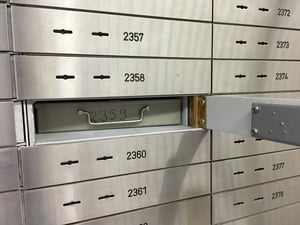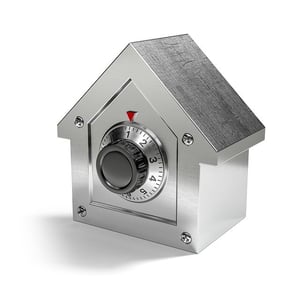As noted in a recent post, Should I Invest in a Second Home?, a second home can take many...
5 Ways to Safely Store Your Personal Information
The majority of American adults have not taken legal planning steps to organize and store their personal and financial information. In fact, only 68% of people over the age of 65 have a finalized will. Although taking these planning steps can be difficult, it is essential to have this information available to the family at the time of death.
Before storing this information, the first step is to gather necessary legal documents, such as Power of Attorney, Guardian of Affairs, Will and Testament, Advanced Directives, Life Insurance Policy, and End-of-Life Instruction. Once these legal documents are gathered and organized, there are various storage options. Here are the top five:
- Utilize an attorney, executor, or family member
- Store in the home
- Go digital
- Store in a safe deposit box
- Keep in a personal fire safe
Secure Options to Store Your Personal Information
1. Utilize an Attorney, Executor, or Family Member
 Having an attorney, executor, or family member store the documents certifies that they are aware and agree to honor wishes upon death. This can also be a cost-free option. Attorneys, however, will come with a fee. Law firms have different costs and procedures depending on where the information is stored and with whom. While this method ranks high in security, it may create challenges related to convenience and easy access to the information.
Having an attorney, executor, or family member store the documents certifies that they are aware and agree to honor wishes upon death. This can also be a cost-free option. Attorneys, however, will come with a fee. Law firms have different costs and procedures depending on where the information is stored and with whom. While this method ranks high in security, it may create challenges related to convenience and easy access to the information.
2. Store it at Home

Many people find comfort in storing their personal and financial information and documents in their home because it is accessible to them at all times. While this is the most cost-efficient storage method, some risks follow, such as forgetting where the information is stored within the home and the possibility of theft and natural disasters. Make sure to inform a trusted person, such as a spouse or other family member, where this information is hidden to ensure it is never lost.
3. Go Digital
 Similar to information hidden in the home, storing information on a personal computer allows access to information at all times. This can be a more secure option because you will also be able to add, correct, and update information 24/7. However, it may require that some paper documents need to be converted to digital format by scanning. Even though this storage method is more secure than hiding physical information in the home, it comes with its own risks. It is imperative to have this information password protected. To create a strong and secure password, avoid using easily accessible information such as birthdates, pet names, names of loved ones, etc. Make sure always to use a combination of letters, capital and lowercase, numbers, and other characters. Having a strong password helps keep hackers from accessing information; however, the risk of hackers will always be prevalent, regardless of taking security measures.
Similar to information hidden in the home, storing information on a personal computer allows access to information at all times. This can be a more secure option because you will also be able to add, correct, and update information 24/7. However, it may require that some paper documents need to be converted to digital format by scanning. Even though this storage method is more secure than hiding physical information in the home, it comes with its own risks. It is imperative to have this information password protected. To create a strong and secure password, avoid using easily accessible information such as birthdates, pet names, names of loved ones, etc. Make sure always to use a combination of letters, capital and lowercase, numbers, and other characters. Having a strong password helps keep hackers from accessing information; however, the risk of hackers will always be prevalent, regardless of taking security measures.
Another risk of storing information on a personal computer is that the hard drive can crash, leading to the loss of all stored data. To avoid this, regularly back up the computer hard drive and make a copy of all information stored at a location other than the home. This will also prevent data loss if the computer is damaged in a natural disaster.
To combat these risks of storing information on a personal computer, consider utilizing services like TAMVOES, which allows you to securely store important documents virtually on the TAMVOES platform. It's a new and more secure way of having copies of your medical records all in the same place. You can even decide to share documents with specific people (family members, doctors, etc.) This way, in case of an emergency all your files are quick and easy to access.
4. Store in a Safe Deposit Box
 Unlike the storage methods previously stated, information held in a safe deposit box cannot be accessed without proper authorization. This means there is no threat of someone seeing the documents unless permission has been granted to them. The risk of theft or natural disasters is less likely than other methods but still possible. If information were to be stolen or missing, most banks' liability insurance would provide compensation.
Unlike the storage methods previously stated, information held in a safe deposit box cannot be accessed without proper authorization. This means there is no threat of someone seeing the documents unless permission has been granted to them. The risk of theft or natural disasters is less likely than other methods but still possible. If information were to be stolen or missing, most banks' liability insurance would provide compensation.
Although risks of storing information in a safe deposit box are minimal, there are a few downfalls, such as storage capacity and limited access based on the bank's hours of operation. Access is granted to the safe deposit box by a key, which the owner is responsible for keeping. It is wise to assign a co-owner to the safe deposit box to access the information if the owner were to die. In most states, the co-owner will only be granted access with a copy of the death certificate and proof from an executor.
5. Keep in a Personal Fire Safe
 Rather than paying annual fees for a safe deposit box, a personal fire safe is a one-time fee with anytime access to personal and financial information with the key or security code. Depending on the quality of the safe, information can be protected against theft and natural disasters. While this is a highly secure, in-home security method, it can be more costly than others, largely depending on the safe's size and durability.
Rather than paying annual fees for a safe deposit box, a personal fire safe is a one-time fee with anytime access to personal and financial information with the key or security code. Depending on the quality of the safe, information can be protected against theft and natural disasters. While this is a highly secure, in-home security method, it can be more costly than others, largely depending on the safe's size and durability.
When considering the various storage options, assess each option's security level and choose a security method with the highest security within budget. Regardless of which security method is selected, it is vital to securely store personal and financial information sooner rather than later.
Let us know in the comments below - how do you keep your personal information safe?






